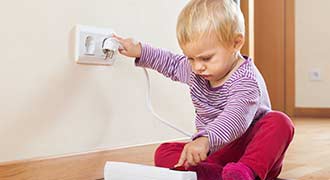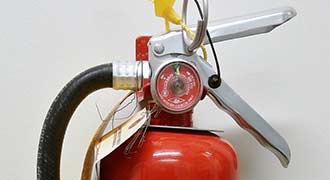The last full week of August, Aug. 23-29 this year, has been designated at National Safe at Home Week. Do we really need a week to remind ourselves to stay safe at home? Let’s look at the numbers. About 1.2 million people get injured at home each year. This is a good time for all of us to become more aware of the dangers lurking in our homes. Injuries that occur at home such as falls, electrocutions, food-borne illnesses and accidental poisoning.

Tips to Stay Safe at Home
People of all age groups are likely to suffer injuries at home. But children and the elderly are probably more vulnerable to suffer serious injuries as a result of hazards lurking at home. Here are just a few tips to help you become more aware of what you need to do in order to make your home a safe zone.
- Do a walk-through of your home to look for and identify potential trouble spots.
- The leading cause of accidental deaths involving children in the home is poisoning. Make sure you keep medicines and household chemicals safely out of the reach of children, even if it means keeping them locked up. Be careful also about the household cleaning items under the sink.
- For adults, the number one cause of household fatalities is slip-and-fall accidents. Among the steps you can take to prevent slip-trip-and-fall accidents include having proper lighting at home, cleaning up spills promptly, keeping hallways and stairs clear of debris or other objects, installing handrails on stairs and promptly removing ice and snow from walkways and surfaces during the winter.
 If you have young children at home, purchase and install covers for all unused electrical outlets.
If you have young children at home, purchase and install covers for all unused electrical outlets.- If you have blinds or window coverings, make sure the blind cords are short. The longer cords can pose a strangulation hazard.
- If you have a swimming pool in your backyard, make sure you erect a fence and keep the area locked and inaccessible to children. It is also a good idea to have motion sensors so you know when your child has wandered into the pool area.
- Make sure you have working smoke alarms. Change the batteries in the spring and fall.
- Never overload electrical circuits and use appliances and tools according to manufacturer’s instructions.
 Remove potential fire hazards and have a fire safety plan. Do not clutter your home with materials that can help fuel a fire.
Remove potential fire hazards and have a fire safety plan. Do not clutter your home with materials that can help fuel a fire.- Have an emergency plan for disasters such as fires and earthquakes.
If You Have Been Injured
 If you or a loved one has been injured in an accident at home as the result of a dangerous or defective product, you may be able to seek compensation for your damages. In such cases, it would be in your best interest to contact an experienced Rhode Island personal injury lawyer who can help you better understand your legal rights and options. To schedule a free consultation and comprehensive case evaluation, please call us toll free at 1-800-992-6878.
If you or a loved one has been injured in an accident at home as the result of a dangerous or defective product, you may be able to seek compensation for your damages. In such cases, it would be in your best interest to contact an experienced Rhode Island personal injury lawyer who can help you better understand your legal rights and options. To schedule a free consultation and comprehensive case evaluation, please call us toll free at 1-800-992-6878.


